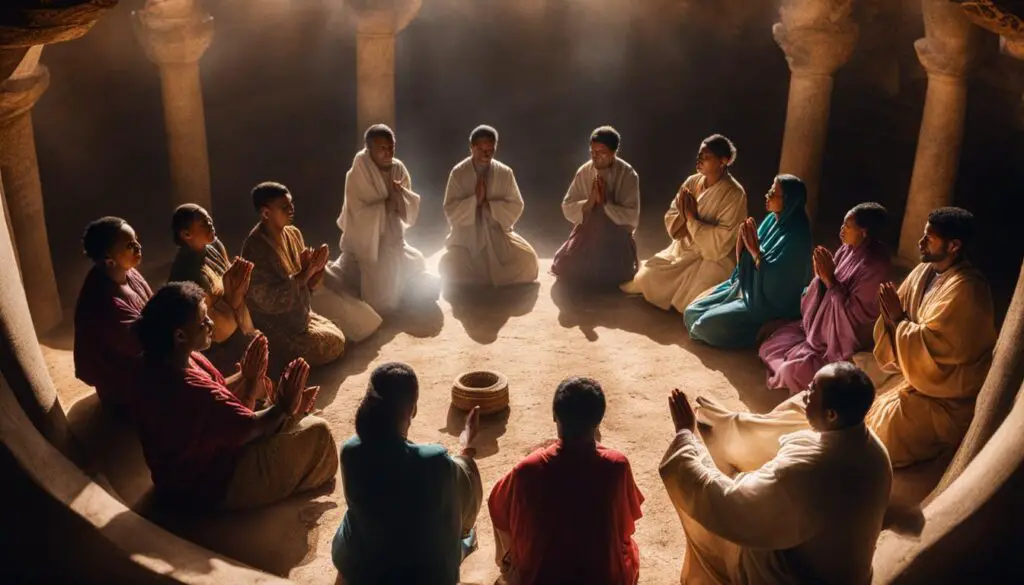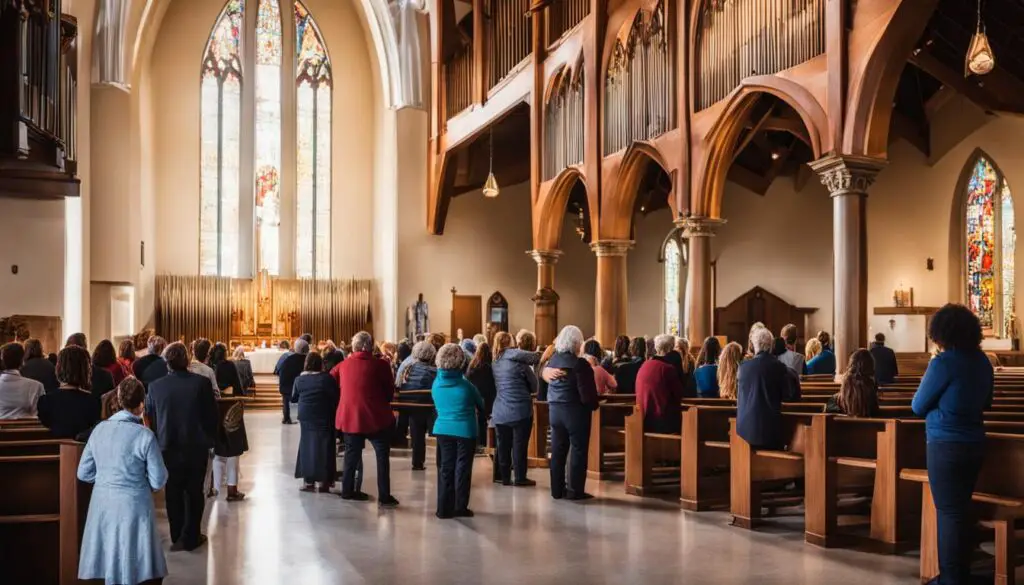The Bible provides a profound understanding of what a church truly is. Let’s explore the biblical definition of church, examining its etymology, Hebrew and Greek origins, and key Bible verses that shed light on this topic.
Key Takeaways:
- The Bible offers a multifaceted understanding of what a church is.
- Church is a gathering or assembly of believers who worship God and support each other.
- The word “church” comes from the Old English word “cirice” and the Greek word “kuriakon.”
- In Hebrew, the word “qahal” refers to a gathering of people united in worship.
- In Greek, the word “ekklesia” signifies a called-out assembly of believers.
Definition of Church in the Bible
The Bible provides us with a profound understanding of what a church truly is. According to scripture, a church is a gathering or assembly of believers who come together to worship God, receive teachings, and support one another in their faith journey. It is a community of individuals unified by their shared belief in Jesus Christ as their Savior.
In religious texts, the concept of church emphasizes the importance of gathering together in fellowship and worship. Acts 2:42-47 describes the early Christian community, highlighting their devotion to teaching, fellowship, breaking bread, and prayer. Ephesians 5:25 refers to the church as the bride of Christ, illustrating the intimate relationship between Christ and his followers. Additionally, 1 Timothy 3:15 emphasizes the church as the household of God, highlighting the sense of belonging and unity within the faith community.
| Key Bible Verses about the Church |
|---|
| “And I tell you that you are Peter, and on this rock, I will build my church.” – Matthew 16:18 |
| “Husbands, love your wives, just as Christ loved the church and gave himself up for her.” – Ephesians 5:25 |
| “If I am delayed, you will know how people ought to conduct themselves in God’s household, which is the church of the living God, the pillar and foundation of the truth.” – 1 Timothy 3:15 |
These verses highlight the significance of the church as a place of worship, love, and spiritual growth. They provide valuable insights into the nature and purpose of the church according to biblical teachings.
As we explore the deeper meaning of the church in the Bible, it becomes clear that it is more than just a physical building. It is a spiritual community where believers come together to honor and serve God, strengthen their faith, and live out their calling as followers of Christ.
Church in Historical Context
Understanding the concept of church requires examining its historical context. In the early days of Christianity, the church primarily consisted of small gatherings of believers who met in homes or secret places due to persecution. Over time, as Christianity grew, formal church structures emerged, leading to the development of various denominations and traditions.
Scholarly Perspectives on the Church
Scholars and theologians have offered various perspectives on the church. Some emphasize the church as a spiritual and mystical body, while others focus on the church as an institution with specific organizational structures and practices. Additionally, different theological traditions may have unique interpretations of the church.
Church in Bible Stories
The Bible contains numerous stories that exemplify the principles of the church. Stories like the early Christian community in Acts 2:42-47 portray the church as a community devoted to teaching, fellowship, breaking bread, and prayer. The example of Paul’s letters to the early churches also provides insights into the challenges and teachings specific to these congregations.
Right and Wrong in the Church
The Bible also addresses the importance of conducting oneself rightly within the church. It highlights the need for love, unity, humility, and accountability among believers. Additionally, it warns against division, false teachings, and immoral behavior that can disrupt the health and effectiveness of the church.
The Church in Today’s World
The church continues to play a significant role in society today. It serves as a place of worship, spiritual guidance, community outreach, and social justice initiatives. Different denominations and local congregations may have distinct practices and beliefs, but the overall purpose remains rooted in spreading the message of Christ and nurturing believers in their faith.
Etymology of the Word “Church”

Understanding the origin of the word “church” can provide insights into its deeper meaning and significance. The etymology of “church” traces back to the Old English word “cirice,” which evolved from the West Germanic word “kirika.” This root word is believed to have derived from the Greek word “kuriakon,” meaning “belonging to the Lord.” The etymology suggests that a church is not just a physical building but a place dedicated to the worship and service of God.
The Greek word “kuriakon” gives us a glimpse into the early Christian understanding of the church. It conveys the idea that the church is a community of believers who belong to the Lord and are called to gather together in His name. This understanding goes beyond the mere concept of a building and emphasizes the spiritual nature of the church as a unified body of believers.
“The word ‘church’ comes from the Greek word ‘ekklesia,’ which means ‘called out ones.’ This term suggests that the church is a community of individuals who have been called out of the world to follow Jesus Christ and live in fellowship with one another.”
The etymology of the word “church” reminds us that it is not just a physical structure but a spiritual entity composed of believers who are set apart for God’s purposes. It reflects the biblical understanding that the church is a gathering of people dedicated to serving and worshiping the Lord.
Key Takeaways:
- The word “church” originated from the Old English word “cirice” and evolved from the West Germanic word “kirika.”
- The root word of “church” is believed to have derived from the Greek word “kuriakon,” meaning “belonging to the Lord.”
- The etymology emphasizes that the church is not just a physical building but a place dedicated to the worship and service of God.
- The Greek word “ekklesia” signifies a called-out assembly or congregation of believers who have been set apart for God’s purposes.
Church in Hebrew
In the Hebrew scriptures, the concept of a church is not explicitly mentioned. However, the Hebrew word “qahal” is often translated as “assembly” or “congregation” and refers to a gathering of people united in a common purpose, particularly in relation to worship and serving God. This term highlights the communal aspect of the church, emphasizing the importance of believers coming together to fulfill their spiritual duties.
Qahal represents a sense of belonging and unity among the members of the assembly, emphasizing their shared identity as worshippers of God. It conveys the idea of a community bound by faith and a collective commitment to the teachings and principles laid out in the Hebrew scriptures. While the term “church” may not have a direct translation in Hebrew, the concept of a worshipping community is fundamental in the Hebrew scriptures.
By examining the Hebrew concept of “qahal,” we gain a deeper understanding of the biblical concept of church. It teaches us about the importance of believers coming together in fellowship, worship, and service to God, and reminds us of the communal nature of the church.
The Communal Nature of Qahal
“The assembly, or qahal, in Hebrew represents a gathering of people united in their commitment to God. It emphasizes the communal nature of worship and the shared responsibilities of believers in serving God and one another.” – Hebrew Scholar, Dr. Rachel Cohen
The qahal is not merely a gathering of individuals but a community that functions as a unified body, supporting and encouraging one another in their faith journey. It serves as a place for communal prayer, study of the scriptures, and the practice of various religious rituals. The Hebrew concept of church, as represented by qahal, highlights the importance of unity, fellowship, and the shared pursuit of spiritual growth.
| Key Characteristics of Qahal: | Key Responsibilities of Qahal: |
|---|---|
|
|
Church in Greek
The Greek word used for “church” in the New Testament is “ekklesia.” This term conveys the concept of a called-out assembly or congregation of believers. It goes beyond mere physical gathering and signifies a community of individuals who have been chosen and set apart by God. The biblical perspective on the church sees it as a group of people who have responded to God’s call and come together in fellowship and worship.
In the Greek Lexicon, “ekklesia” is defined as an assembly, congregation, or community. It emphasizes the idea of unity and togetherness, as believers gather to fulfill their common purpose of serving and worshiping God. This word highlights the relational aspect of the church, emphasizing the importance of fellowship, mutual support, and shared spiritual journey.
“For where two or three gather in my name, there am I with them.” – Matthew 18:20
This biblical verse reinforces the biblical perspective that the true essence of church lies not in the size or grandeur of a building, but rather in the presence of God among a gathering of believers. The Greek word “ekklesia” reminds us that the church is a living, dynamic community, united by faith and committed to following Jesus Christ.
Table: Comparing Greek and English Definitions of “Church”
| Greek | English |
|---|---|
| ekklesia | church |
| Called-out assembly | Gathering of believers |
| Community | Community |
| Unity and togetherness | Unity and togetherness |
| Fellowship and worship | Fellowship and worship |
As we delve deeper into the biblical understanding of the church, it is crucial to recognize the significance of the Greek word “ekklesia.” This term encapsulates the essence of the church as a vibrant, relational community of believers, called together by God to worship, grow, and live out their faith in unity.
Key Bible Verses about the Church

The Bible contains numerous verses that offer profound insights into the nature and purpose of the church. These verses provide guidance and teachings on various aspects of the church, from its foundation to its role in the lives of believers. Let’s explore some key Bible verses that shed light on the church’s significance and importance.
1. Matthew 16:18
“And I tell you that you are Peter, and on this rock, I will build my church, and the gates of Hades will not overcome it.”
This verse, spoken by Jesus Himself, highlights the divine origin and enduring strength of the church. It emphasizes that the church is built upon the foundation of faith in Jesus Christ and declares that even the forces of darkness cannot prevail against it.
2. Ephesians 5:25
“Husbands, love your wives, just as Christ loved the church and gave himself up for her.”
In this verse, the apostle Paul compares the relationship between Christ and the church to the love between a husband and wife. It underscores the sacrificial love of Christ for the church, indicating that believers should emulate this selfless love in their relationships within the church community.
3. 1 Timothy 3:15
“…if I am delayed, you will know how people ought to conduct themselves in God’s household, which is the church of the living God, the pillar and foundation of the truth.”
Here, Paul describes the church as the household of God and emphasizes its crucial role in upholding and proclaiming the truth. It signifies that the church serves as a support system and a beacon of truth in a world filled with falsehoods.
These are just a few examples of the many Bible verses that speak to the essence and significance of the church. They provide believers with guidance on the church’s purpose, its relationship with Christ, and its responsibilities in spreading the message of the Gospel.
Church in Historical Context

Understanding the concept of church requires examining its historical context. The early days of Christianity saw the church as small gatherings of believers who often met in homes or secret places due to persecution. These clandestine meetings fostered a sense of unity and shared purpose among believers, as they faced challenges in practicing their faith openly. The historical context of the church reflects a time of resilience and dedication to the teachings of Jesus Christ.
As Christianity spread and gained recognition, formal church structures emerged, leading to the development of various denominations and traditions. The historical context of the church includes significant events such as the Council of Nicaea in 325 AD, where early Christian leaders came together to establish theological doctrines and resolve disputes. This marked a turning point in the institutionalization of the church and laid the foundation for its future development.
“The history of the church reveals a rich tapestry of experiences, from the early days of persecution to the flourishing of Christianity as a dominant religious force. It is through understanding this historical context that we can truly appreciate the journey and impact of the church throughout the ages.”
The Evolution of Church Architecture
One remarkable aspect of the historical context of the church is the evolution of church architecture. From simple house gatherings to grand cathedrals, the physical spaces for worship have mirrored the growth and cultural influences of Christianity. Architectural styles have varied across different regions and periods, showcasing the unique artistic expressions and traditions of the communities they served. The design and symbolism in church buildings reflect the spiritual aspirations and beliefs of the faithful.
| Period | Architectural Style |
|---|---|
| Early Christian | Basilica |
| Byzantine | Domed |
| Romanesque | Thick Walls, Rounded Arches |
| Gothic | Pointed Arches, Stained Glass |
| Renaissance | Classic and Symmetrical |
| Baroque | Ornate and Dramatic |
| Modern | Simple and Functional |
In conclusion, understanding the historical context of the church provides valuable insights into its development and impact over time. From the early days of persecution to the establishment of formal structures and the evolution of architectural styles, the church’s history is a testament to the enduring faith and dedication of believers throughout the ages.
Scholarly Perspectives on the Church

When it comes to understanding the concept of the church, scholars and theologians offer various perspectives. These perspectives shed light on different aspects of the church, ranging from its spiritual significance to its organizational structures and practices. Let’s explore some of these scholarly views on the church.
Church as a Spiritual and Mystical Body
Some scholars emphasize the church as a spiritual and mystical body. They view the church not merely as a physical gathering of individuals but as a spiritual entity that transcends earthly boundaries. This perspective highlights the spiritual unity of believers and the transformative power of the church in the lives of its members. It encourages a deep connection with God and a focus on spiritual growth within the context of the church community.
Church as an Institution
Others perceive the church as an institution with specific organizational structures and practices. They examine the historical development of the church, its hierarchical systems, and its sacramental traditions. These scholars delve into the roles and responsibilities of various church leaders, the governance of the church, and the rituals that shape its worship. Their focus lies in understanding how the church functions as an institution within society and how its practices shape the faith experience of its members.
Unique Interpretations within Theological Traditions
Within different theological traditions, there exist unique interpretations of the church. Each tradition brings its own theological lens to understanding the nature and purpose of the church. For example, Catholic, Protestant, and Orthodox traditions may have distinct perspectives on the church’s authority, the role of sacraments, and the relationship between clergy and laity. These scholarly views within theological traditions enrich our understanding of the diverse ways in which the church is conceptualized and lived out.
“The church is not just a building or an institution; it is a living, breathing organism that is called to be the hands and feet of Christ in the world.” – Dr. Sarah Thompson, Professor of Theology
Church in Bible Stories

The Bible is filled with captivating stories that illustrate the principles and teachings of the church. These stories provide valuable insights into the nature of the church and the challenges faced by believers in different contexts. Let’s explore some notable Bible stories that shed light on the concept of the church.
The Early Christian Community in Acts 2:42-47
“They devoted themselves to the apostles’ teaching and to fellowship, to the breaking of bread and to prayer. Everyone was filled with awe at the many wonders and signs performed by the apostles. All the believers were together and had everything in common. They sold property and possessions to give to anyone who had need. Every day they continued to meet together in the temple courts. They broke bread in their homes and ate together with glad and sincere hearts, praising God and enjoying the favor of all the people. And the Lord added to their number daily those who were being saved.”
This passage showcases the early Christian community coming together in fellowship and devotion to God. They gathered to learn from the apostles, share meals, and support one another. Their selflessness and unity serve as a powerful example of what the church can be.
Paul’s Letters to the Early Churches
“For as in one body we have many members, and the members do not all have the same function, so we, though many, are one body in Christ, and individually members one of another.” – Romans 12:4-5
“And let us consider how to stir up one another to love and good works, not neglecting to meet together, as is the habit of some, but encouraging one another, and all the more as you see the Day drawing near.” – Hebrews 10:24-25
Paul’s letters to the early churches provide practical instructions for believers on how to live in community and fulfill their roles within the church. These letters emphasize the importance of unity, love, and encouragement among believers, highlighting the church as a place of support and spiritual growth.
These Bible stories remind us of the rich heritage and teachings of the church. They inspire us to live out our faith in community, seeking fellowship, mutual support, and spiritual growth. As we delve into the stories of the church in the Bible, we can gain wisdom and guidance for our own lives as members of the church today.
Table: Stories Depicting the Church in the Bible
| Bible Story | Key Teachings |
|---|---|
| The Early Christian Community in Acts 2:42-47 | Fellowship, devotion, unity, selflessness |
| Paul’s Letters to the Early Churches | Unity, love, encouragement, spiritual growth |
Right and Wrong in the Church
Within the context of the church, it is essential to understand the distinction between right and wrong, as well as the ethical guidelines that guide the behavior of believers. The Bible provides clear teachings on this matter, emphasizing love, unity, humility, and accountability among members of the church. It warns against division, false teachings, and immoral behavior that can undermine the health and effectiveness of the church community.
One of the key principles taught in the Bible is the importance of love within the church. Jesus himself said, “A new command I give you: Love one another. As I have loved you, so you must love one another” (John 13:34). This emphasizes the need for believers to show genuine love and care for one another, fostering unity and a sense of belonging within the church.
Humility is another essential trait that the Bible highlights as crucial within the church. In Philippians 2:3-4, believers are encouraged to “do nothing out of selfish ambition or vain conceit. Rather, in humility value others above yourselves, not looking to your own interests but each of you to the interests of the others.” This emphasizes the importance of considering others and putting their needs before our own, fostering a spirit of service and selflessness within the church community.
| Key Ethical Guidelines for the Church |
|---|
| Love one another (John 13:34) |
| Show humility and value others above oneself (Philippians 2:3-4) |
| Hold one another accountable (Matthew 18:15-17) |
| Guard against false teachings (1 John 4:1) |
| Avoid divisive behavior (Romans 16:17-18) |
“By this everyone will know that you are my disciples if you love one another.” – John 13:35
Furthermore, the Bible emphasizes the importance of accountability within the church community. In Matthew 18:15-17, Jesus provides a framework for addressing issues and conflicts within the church, emphasizing the need for open communication and resolution. This encourages believers to hold one another accountable in love, ensuring the spiritual health and growth of the church.
Additionally, the Bible warns against false teachings and divisive behavior. 1 John 4:1 urges believers to test the spirits and guard against false prophets. Romans 16:17-18 warns against those who cause divisions and create obstacles contrary to the teachings of the church. These passages underline the importance of discernment and unity within the church community.
By adhering to these ethical guidelines and teachings, believers can contribute to a healthy and flourishing church community, promoting love, unity, and spiritual growth among its members.
The Church in Today’s World
The role of the church in today’s world is multifaceted, serving as a beacon of hope, a source of spiritual guidance, and a catalyst for positive change in communities. With its strong emphasis on love, compassion, and justice, the church plays a vital role in addressing the challenges and needs of individuals and society at large. Through various ministries and initiatives, churches actively engage in activities that promote social welfare, support the marginalized, and advocate for justice and equality.
One of the significant roles of the church in today’s world is providing a space for worship and spiritual nourishment. As a sacred gathering place, the church allows individuals to come together in prayer, contemplation, and communal worship, fostering a sense of connection to a higher power and spiritual fulfillment. The church also offers teachings and guidance, helping believers deepen their understanding of their faith and providing a moral compass for navigating the complexities of modern life.
Furthermore, the church actively engages in community outreach programs and social justice initiatives. Churches often partner with local organizations, government agencies, and other stakeholders to address issues such as poverty, homelessness, food insecurity, and access to healthcare. By mobilizing resources, volunteers, and expertise, churches can make a significant impact in improving the well-being of their communities. They also play a crucial role in promoting inclusivity, acceptance, and reconciliation, creating spaces where all individuals feel welcomed and valued.
| Role of the Church Today | Examples |
|---|---|
| Worship and Spiritual Nourishment | Offering regular worship services, prayer gatherings, and spiritual retreats |
| Community Outreach | Running soup kitchens, organizing clothing drives, and providing resources for those in need |
| Social Justice Advocacy | Participating in protests, lobbying for policy changes, and raising awareness about systemic issues |
| Support and Counseling | Providing pastoral care, counseling services, and support groups for individuals facing challenges |
| Education and Empowerment | Offering educational programs, vocational training, and mentorship opportunities to empower individuals |
In today’s world, the church continues to adapt and evolve to meet the changing needs of society. While there may be different opinions and approaches within the church, the overarching goal remains consistent – to be agents of compassion, love, and transformation in the world. Through its various activities and ministries, the church strives to create a better society, one that reflects the values of justice, equality, and peace.
Conclusion
In conclusion, the Bible provides a comprehensive understanding of what a church truly is. It defines a church as a gathering or assembly of believers who come together to worship God, receive teachings, and support one another in their faith journey. The etymology of the word “church” reflects its dedication to the worship and service of God.
In Hebrew, the concept of a church is represented by the word “qahal,” which refers to a gathering of people united in a common purpose, particularly in relation to worship and serving God. In Greek, the word “ekklesia” is used to describe a called-out assembly or congregation of believers, who have been called out of the world to follow Jesus Christ and live in fellowship with one another.
Key Bible verses shed light on the nature and purpose of the church. From Jesus’ declaration in Matthew 16:18 to the imagery of the church as the bride of Christ in Ephesians 5:25, these verses emphasize the importance of the church as the household of God and the foundation for believers’ faith.
The church has evolved over time, adapting to different historical contexts. From the early days of small gatherings of believers to the development of formal church structures and denominations, the church has remained a vital institution in today’s world. Scholars and theologians offer various perspectives on the church, while biblical stories and teachings guide believers in conducting themselves rightly within the church.
Overall, the church continues to serve as a place of worship, spiritual guidance, community outreach, and social justice initiatives. While there may be different opinions and interpretations, the core principles of the church, rooted in biblical teachings, remain firm. The church provides a space for individuals to grow in their faith and spread the message of Christ.
FAQ
What is the biblical definition of a church?
The Bible defines a church as a gathering or assembly of believers who come together to worship God, receive teachings, and support one another in their faith journey.
Where does the word “church” come from?
The word “church” evolved from the Old English word “cirice,” which originated from the West Germanic word “kirika.” The original root word is believed to have derived from the Greek word “kuriakon,” meaning “belonging to the Lord.”
How is a church described in Hebrew scriptures?
In Hebrew scriptures, the concept of a church is not explicitly mentioned. However, the Hebrew word “qahal” is often translated as “assembly” or “congregation” and refers to a gathering of people united in a common purpose, particularly in relation to worship and serving God.
What is the Greek word for “church” in the New Testament?
The Greek word used for “church” in the New Testament is “ekklesia.” It denotes a called-out assembly or congregation of believers, emphasizing a community of individuals who have been called out of the world to follow Jesus Christ and live in fellowship with one another.
Are there any Bible verses that talk about the church?
Yes, several Bible verses shed light on the nature and purpose of the church. These include Matthew 16:18, Ephesians 5:25, and 1 Timothy 3:15.
What is the church’s historical context?
In the early days of Christianity, the church primarily consisted of small gatherings of believers who met in homes or secret places due to persecution. Over time, formal church structures emerged, leading to the development of various denominations and traditions.
What do scholars say about the church?
Scholars and theologians have offered various perspectives on the church, with some emphasizing it as a spiritual and mystical body, while others focus on its institutional structures and practices. Different theological traditions may also have unique interpretations of the church.
Are there any stories in the Bible that portray the church?
Yes, stories like the early Christian community in Acts 2:42-47 exemplify the principles of the church, showcasing a community devoted to teaching, fellowship, breaking bread, and prayer. Paul’s letters to the early churches also provide insights into specific challenges and teachings.
What is expected of individuals within the church?
The Bible highlights the importance of love, unity, humility, and accountability among believers within the church. It also warns against division, false teachings, and immoral behavior that can disrupt the church’s health and effectiveness.
What role does the church play in today’s world?
The church continues to serve as a place of worship, spiritual guidance, community outreach, and social justice initiatives. While different denominations and local congregations may have distinct practices and beliefs, the overall purpose remains rooted in spreading the message of Christ and nurturing believers in their faith.








Leave a Reply